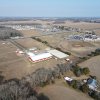Nature Center concerned over red knots' decline
The US Fish and Wildlife Service extended the public comment period to June 15 on the proposal to list the rufa red knot as a threatened species under the Endangered Species Act. The red knot population has declined due to changing climate conditions, which have impacted the timing of migration, breeding habitat, and food supply.
In the Delaware Bay, fishing practices that rely heavily on the use of horseshoe crabs, a primary food source for red knots and other shorebirds, have also contributed to the decline of the red knot population.
The red knot visits the Delaware Bay each spring during its migration from Tierra del Fuego to the Canadian Arctic. The Delaware Bay beaches support the largest concentration of spawning horseshoe crabs along the Atlantic Coast. The red knots feast on horseshoe crab eggs and increase their weight by 50 to 100 percent. Without horseshoe crab eggs as a food source, the red knot is unable to sufficiently replenish the fat reserves that sustain them on their long migratory flights of up to 18,600 miles a year.
In the mid-1990s, the horseshoe crab became a popular fishing bait, decimating their population and causing a massive decline in available eggs for red knots to feed on. The number of red knots stopping at Delaware Bay dropped from almost 95,000 in 1989 to fewer than 16,000 birds in 2009, an 83 percent decrease.
One of Delaware Nature Society’s programs is focused on the importance of shorebirds and horseshoe crabs. Program participants witness the red knots and other shorebirds feasting on horseshoe crab eggs and learn about how to help protect horseshoe crabs and shorebirds. This year, program participants rescued over 100 horseshoe crabs when they removed them from the riprap off Port Mahon Road.
“Whether you free a horseshoe crab from where it is wedged between rocks or whether you email your public comment about listing red knots as a threatened species under the Endangered Species Act in the Federal Register so that this remarkable shorebird can be protected, everyone can do something about this issue today,” said Delaware Nature Society Environmental Advocate Brenna Goggin.
To submit public comments to the Federal Register, visit www.regulations.gov and enter into the search box Docket Number FWS–R5–ES–2013–0097 and then click “Comment Now!”



















































